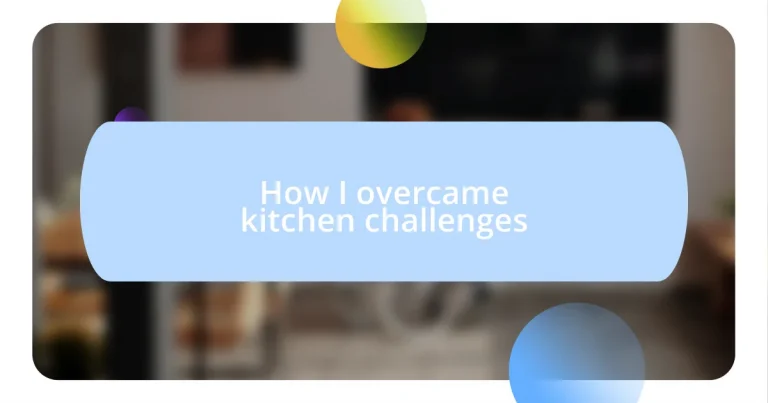Key takeaways:
- Identifying and addressing kitchen challenges, such as ingredient confusion and time management, is essential for building confidence and enjoyment in cooking.
- Developing meal planning strategies and mastering essential cooking techniques streamline the cooking process, enhance creativity, and reduce stress.
- Celebrating cooking successes, both big and small, fosters a positive mindset and encourages continuous improvement in the kitchen.
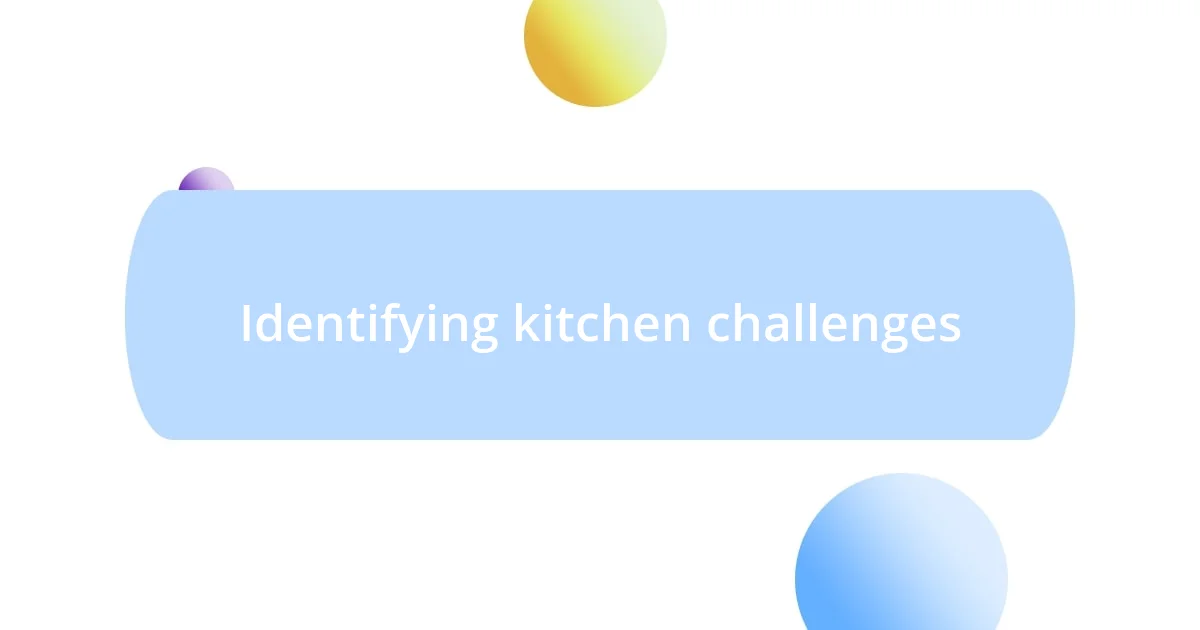
Identifying kitchen challenges
One of the first steps in overcoming kitchen challenges is clearly identifying them. I remember standing in my own kitchen, surrounded by an array of spices but unsure how to create a cohesive dish. Have you ever found yourself lost among your ingredients, wondering where to start? It can be overwhelming, and that’s a common challenge many of us face.
Another significant challenge I’ve encountered is managing time effectively. There were nights when I felt rushed, and the stress of a ticking clock led to haphazard meals. How often do we find ourselves juggling multiple tasks—chopping, boiling, and cleaning—all at once? Realizing I needed to streamline my process made a huge difference in both my cooking and my enjoyment of it.
Lastly, I’ve noticed that skill gaps can really hold us back. When I first attempted complex recipes, I found myself frustrated by basic techniques I hadn’t mastered yet. It made me question my abilities in the kitchen. Have you experienced that moment of self-doubt? Recognizing these gaps isn’t a sign of defeat; it’s the first step toward building a more confident kitchen routine.
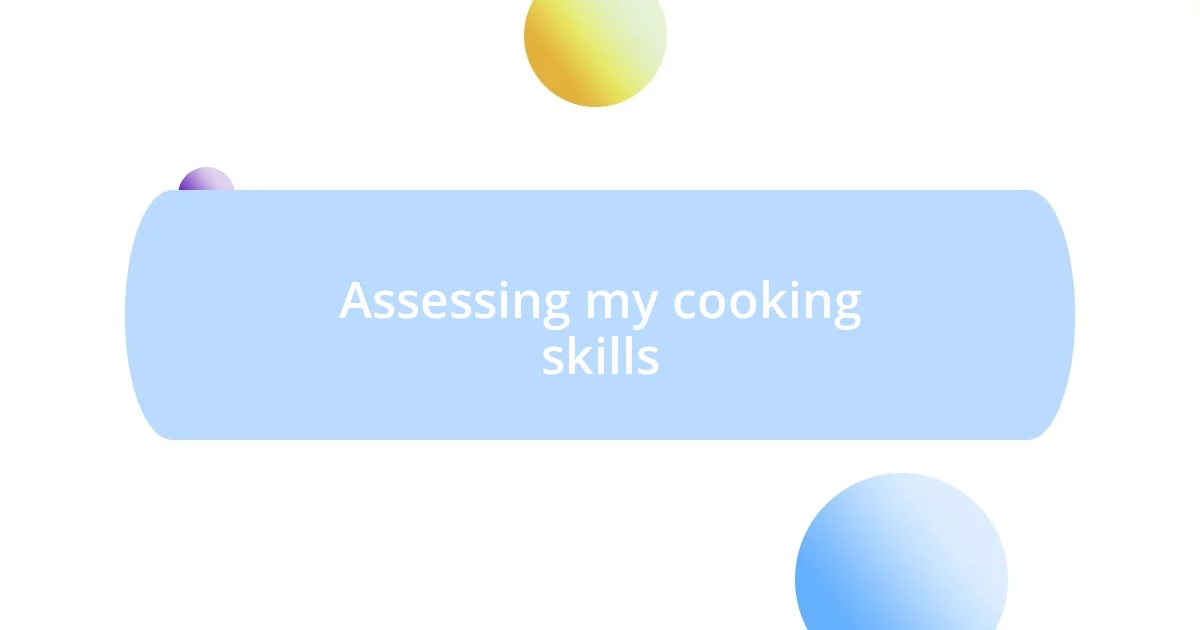
Assessing my cooking skills
Assessing my cooking skills was initially a humbling experience. I vividly recall the time I decided to try my hand at homemade pasta. Excitedly, I rolled out the dough, only to realize halfway through that my timing and technique were off. It was a messy affair, but it taught me a lot about where I stood in my culinary journey.
To evaluate my skills, I created a list of key areas that needed attention:
- Basic Techniques: Chopping, sautéing, and baking—these foundational skills were crucial.
- Recipe Understanding: Comprehending measurements and ingredient interactions helped me reduce mistakes.
- Creativity: Learning how to improvise with what I had on hand broadened my cooking horizons.
- Timing and Organization: Developing a sense of when things needed to be done to serve a meal on time was essential.
- Confidence in Flavor: Trusting my palate and experimenting with spices turned cooking from a chore into an adventure.
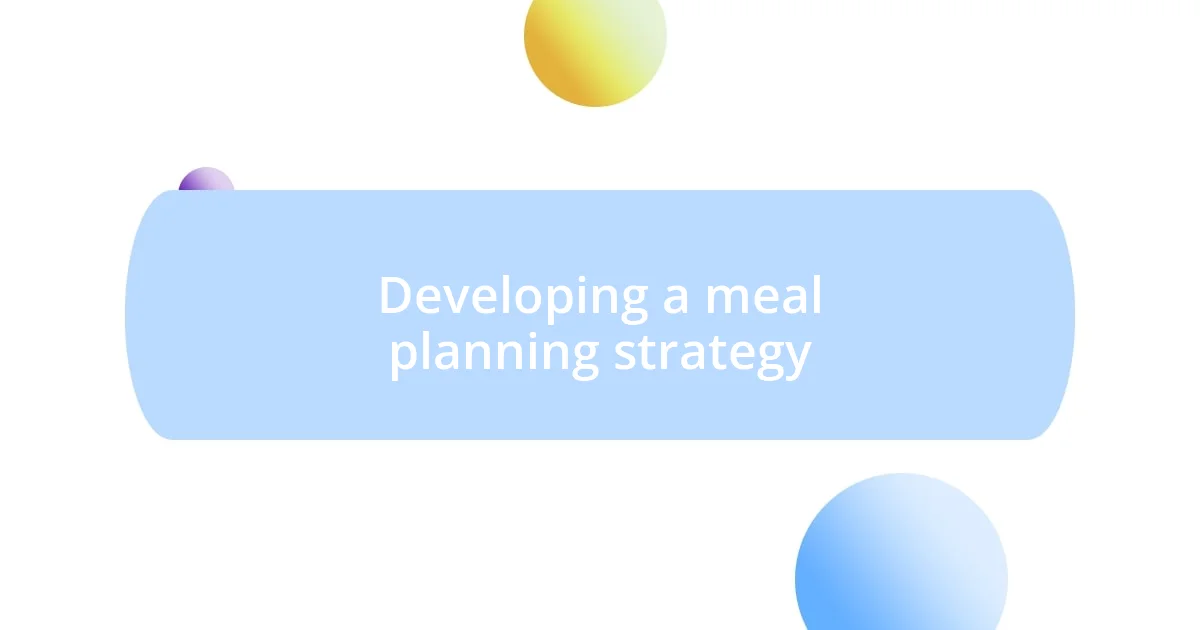
Developing a meal planning strategy
Developing a meal planning strategy was a game changer for me. One particular Sunday, I sat down with my favorite notebook and realized that having a plan not only saving me time but also reduced my anxiety during the busy week. Picture this: no more frantic trips to the grocery store after a long day at work. Instead, I started enjoying the process of selecting recipes that excited me and fit my schedule.
I began by analyzing my week—what days would be busy and what meals could be made ahead. This led me to embrace batch cooking, where I would whip up larger portions of my favorite dishes. I stayed motivated by keeping things fresh and experimenting with seasonal ingredients. I remember the satisfaction I felt when I opened my fridge filled with healthy meals, knowing they were ready to go. Have you ever felt that rush of pride knowing your efforts in meal planning could feed you throughout the week? It’s not just about convenience; it’s about nurturing yourself.
Now, let’s talk about variety. I found that mixing up my meals with themes for each day kept things interesting. For instance, I designated Meatless Mondays and Taco Tuesdays to apply a fun twist to routine planning. This method meant I could look forward to cooking, rather than seeing it as a chore. What strategies have you employed to make meal planning more enjoyable? Reflecting on your own experiences can help you discover a personalized approach that brings joy into your kitchen.
| Meal Planning Strategy | Impact |
|---|---|
| Batch Cooking | Time-saving for busy days, reduces food waste. |
| Theme Days | Adds fun and variety, keeps meals interesting. |
| Seasonal Ingredients | Enhances flavor, promotes creativity, supports local farmers. |
| Weekly Review | Identifies what worked, improves future planning efficiency. |

Learning effective time management
Managing time effectively in the kitchen can feel overwhelming at first. Early on, I learned the hard way that timing is everything. One night, I was preparing a roast while simultaneously trying to whip up a side dish. As the roast neared perfection, I realized the side was still in its raw ingredients phase. The ensuing chaos sharpened my focus on how crucial it is to dedicate specific times for each task. From that moment, I couldn’t help but wonder: how many culinary disasters could be avoided with better time management?
I once struck gold with a simple trick: using a timer for every step of my cooking process. In an early batch-cooking venture, I found myself losing track of time while sautéing vegetables. Setting a timer reminded me to check in before they turned into a mushy mess. Isn’t it amazing how something so simple can transform your kitchen experience? I now embrace this practice for everything, turning what was once a panic-inducing part of cooking into a more pleasant rhythm.
As I continued refining my time management skills, I discovered the power of prep time. On days when my schedule felt tight, prepping ingredients in advance became my best friend. One Sunday afternoon, I spent a few hours washing, chopping, and seasoning—all while listening to my favorite podcast. I realized that those few hours saved me a whirlwind of stress during the week. Have you tried this approach? The satisfaction of knowing that everything is ready to go can make all the difference in maintaining calmness in your culinary adventures.
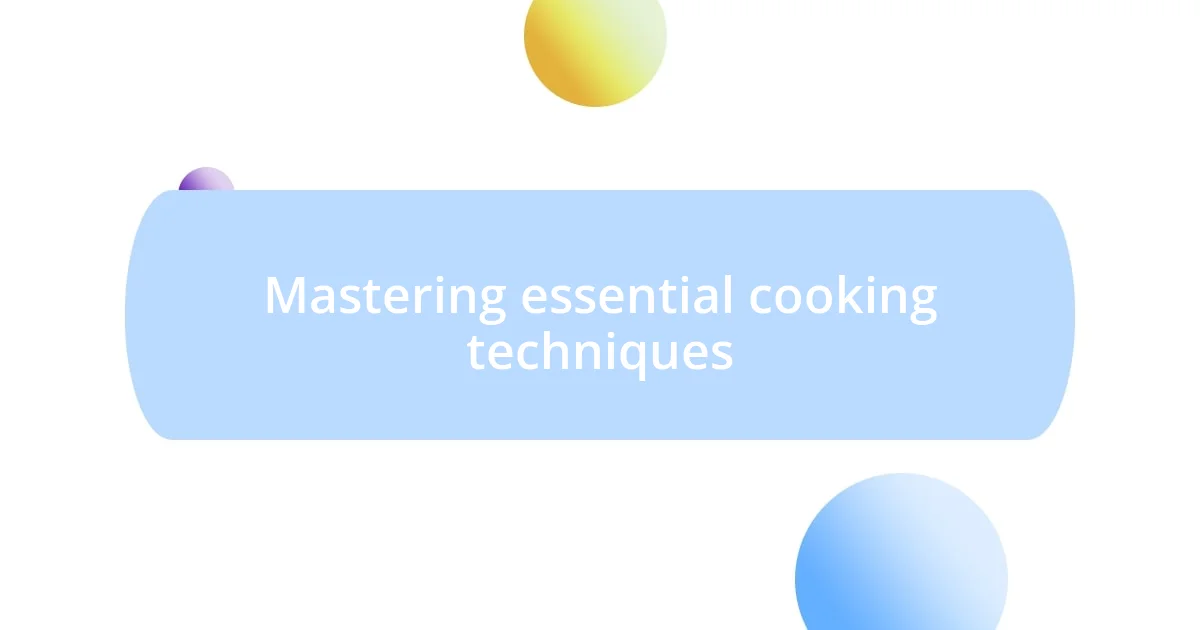
Mastering essential cooking techniques
Mastering essential cooking techniques was definitely a turning point for me. I had always been intimidated by the sheer variety of techniques out there—sautéing, poaching, blanching—it felt endlessly complicated. But when I invested time in learning the fundamentals, something remarkable happened: my confidence began to grow. I remember the first time I successfully sautéed vegetables to a perfect golden brown. The aroma filled my kitchen, and I couldn’t help but smile at my accomplishment. Isn’t it incredible how mastering these basic skills can transform not only your cooking but your entire relationship with food?
One technique that I found particularly helpful was knife skills. At first, I felt clumsy, unsure if I would even survive the dreaded dicing challenge. However, after watching a few videos and practicing daily, my chopping speed and uniformity improved noticeably. The thrill of effortlessly julienning bell peppers became a mini victory for me. It’s funny how something as simple as cutting vegetables correctly not only makes cooking more efficient but also enhances the presentation of dishes. Have you ever underestimated the impact of a well-prepared ingredient?
I also dived into the world of cooking methods that maximize flavor, such as roasting and grilling. One afternoon, I decided to experiment with a simple roasted chicken recipe. With just a few herbs, a squeeze of lemon, and proper seasoning, I pulled it out of the oven to find the most beautiful golden-brown skin. The taste? It blew my mind! This wasn’t just food; it was a celebration. I found that embracing these techniques turned meal prep into a creative outlet rather than a chore. What techniques have you tried that felt intimidating but turned out to elevate your cooking experience?
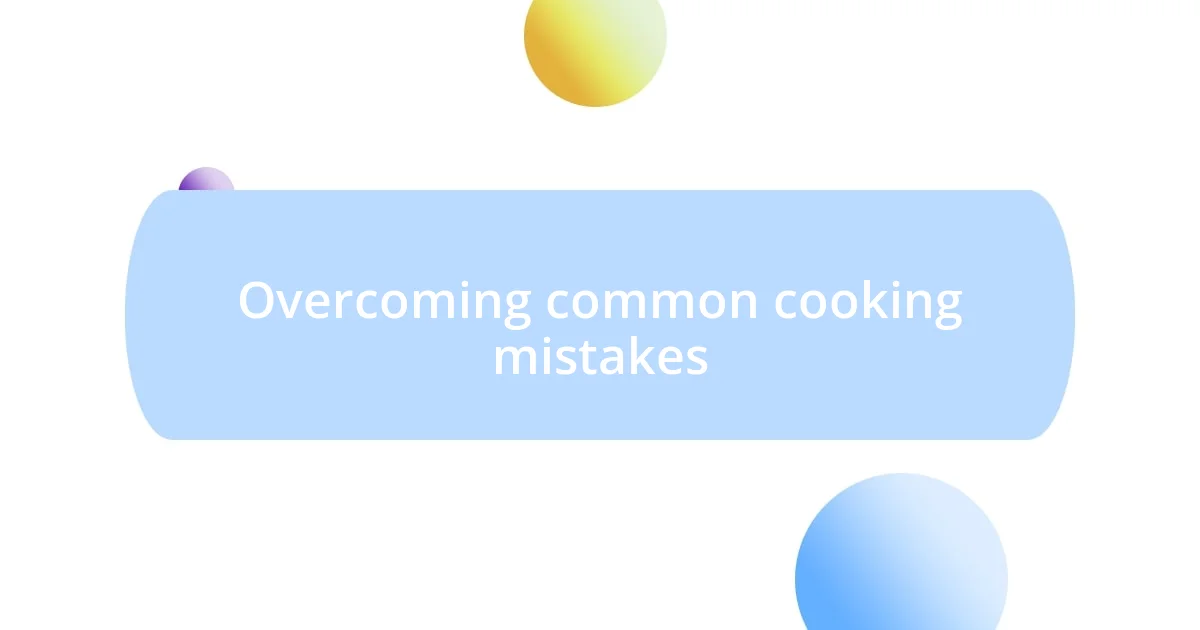
Overcoming common cooking mistakes
When I first began cooking, I often found myself forgetting to read recipes thoroughly before diving in. This led to some hilarious—and definitely disastrous—outcomes. I vividly recall the time I accidentally dumped a cup of salt into my soup instead of sugar. The sheer shock on my face as I took a taste was unforgettable! Now, I make it a point to read through each recipe multiple times beforehand and mentally visualize each step. Have you ever felt that rush of panic when things don’t go as planned in the kitchen?
Another common mistake I encountered was not tasting food as I cooked. Early on, I made the rookie error of relying solely on measurements and directions. This left my dishes tasting bland and uninspiring. I realized that tasting throughout the cooking process is essential; it’s the key to developing flavors. Now, I often taste a pinch from the pan, adjusting spices and ingredients as I go along. Doesn’t it feel empowering to tailor a dish to perfection, ensuring every bite is just right?
Mise en place (a French term meaning “everything in its place”) became my lifesaver after I struggled with juggling multiple ingredients while cooking. I remember crafting a beautiful pasta dish but ended up scrambling for ingredients at the last minute, losing precious cooking time. Now, I take the extra few minutes to prep everything before starting. This small adjustment has made a world of difference! I can focus on the cooking rather than the chaos. Have you ever tried organizing your space before diving into a recipe? It’s like having a secret weapon in your cooking arsenal!
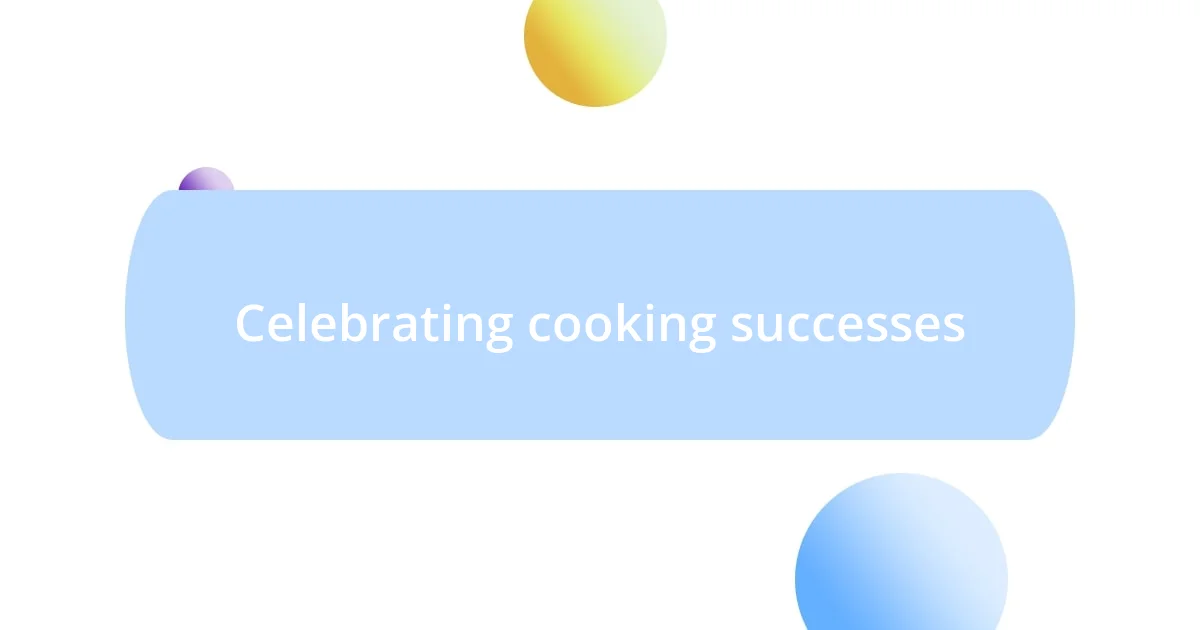
Celebrating cooking successes
Celebrating my cooking successes has become one of my favorite parts of this culinary journey. Just the other week, I successfully baked my first soufflé, and when it puffed up beautifully in the oven, I felt a wave of pride wash over me. I remember jumping excitedly and calling up a friend to share the news. Have you ever found joy in a dish that seemed daunting at first?
There’s something incredibly satisfying about plating a dish that you know you executed well. I recently prepared a complex risotto, and watching it come together felt like magic. The creamy texture and vibrant colors lifted my spirits. I snapped a picture and shared it online, only to be flooded with compliments. In those moments, I realized how cooking not only nurtures the body but also connects us, one shared meal at a time.
Celebrating the little victories is essential too. A simple breakfast omelet—cooked perfectly without burning—is worth acknowledging. I’ve started keeping a small journal of my cooking wins, both big and small. Reflecting on my progress reminds me that every step in the kitchen, even the smallest one, counts. Have you ever paused to celebrate your own kitchen creations? It can be surprisingly uplifting!












